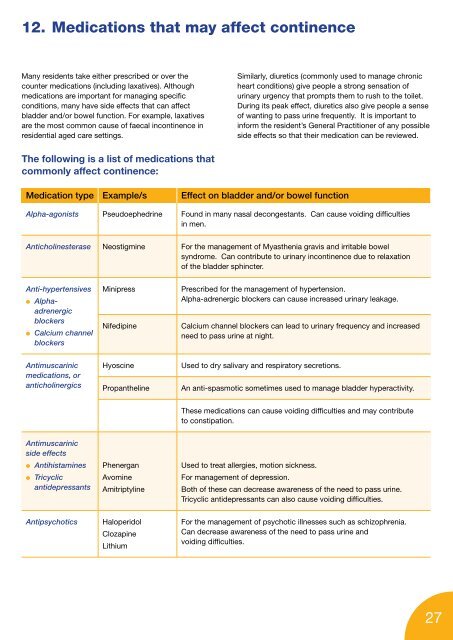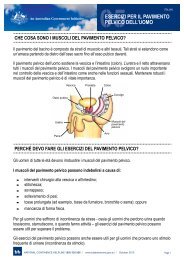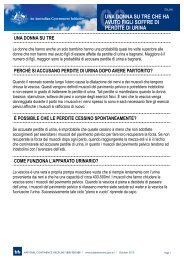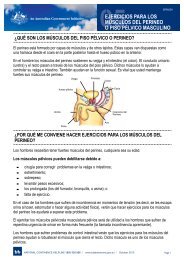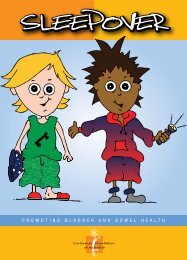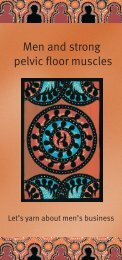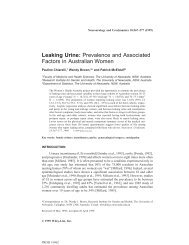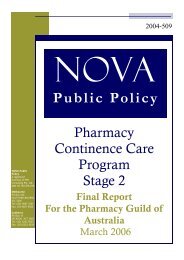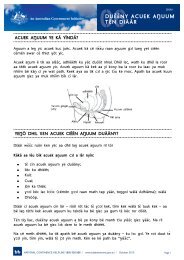Continence Tools for Residential Aged Care - Bladder and Bowel ...
Continence Tools for Residential Aged Care - Bladder and Bowel ...
Continence Tools for Residential Aged Care - Bladder and Bowel ...
You also want an ePaper? Increase the reach of your titles
YUMPU automatically turns print PDFs into web optimized ePapers that Google loves.
12. Medications that may affect continence<br />
Many residents take either prescribed or over the<br />
counter medications (including laxatives). Although<br />
medications are important <strong>for</strong> managing specific<br />
conditions, many have side effects that can affect<br />
bladder <strong>and</strong>/or bowel function. For example, laxatives<br />
are the most common cause of faecal incontinence in<br />
residential aged care settings.<br />
The following is a list of medications that<br />
commonly affect continence:<br />
Similarly, diuretics (commonly used to manage chronic<br />
heart conditions) give people a strong sensation of<br />
urinary urgency that prompts them to rush to the toilet.<br />
During its peak effect, diuretics also give people a sense<br />
of wanting to pass urine frequently. It is important to<br />
in<strong>for</strong>m the resident’s General Practitioner of any possible<br />
side effects so that their medication can be reviewed.<br />
Medication type Example/s Effect on bladder <strong>and</strong>/or bowel function<br />
Alpha-agonists Pseudoephedrine Found in many nasal decongestants. Can cause voiding difficulties<br />
in men.<br />
Anticholinesterase Neostigmine For the management of Myasthenia gravis <strong>and</strong> irritable bowel<br />
syndrome. Can contribute to urinary incontinence due to relaxation<br />
of the bladder sphincter.<br />
Anti-hypertensives<br />
● Alphaadrenergic<br />
blockers<br />
● Calcium channel<br />
blockers<br />
Antimuscarinic<br />
medications, or<br />
anticholinergics<br />
Antimuscarinic<br />
side effects<br />
● Antihistamines<br />
● Tricyclic<br />
antidepressants<br />
Minipress Prescribed <strong>for</strong> the management of hypertension.<br />
Alpha-adrenergic blockers can cause increased urinary leakage.<br />
Nifedipine Calcium channel blockers can lead to urinary frequency <strong>and</strong> increased<br />
need to pass urine at night.<br />
Hyoscine Used to dry salivary <strong>and</strong> respiratory secretions.<br />
Propantheline An anti-spasmotic sometimes used to manage bladder hyperactivity.<br />
Phenergan<br />
Avomine<br />
Amitriptyline<br />
Antipsychotics Haloperidol<br />
Clozapine<br />
Lithium<br />
These medications can cause voiding difficulties <strong>and</strong> may contribute<br />
to constipation.<br />
Used to treat allergies, motion sickness.<br />
For management of depression.<br />
Both of these can decrease awareness of the need to pass urine.<br />
Tricyclic antidepressants can also cause voiding difficulties.<br />
For the management of psychotic illnesses such as schizophrenia.<br />
Can decrease awareness of the need to pass urine <strong>and</strong><br />
voiding difficulties.<br />
27


